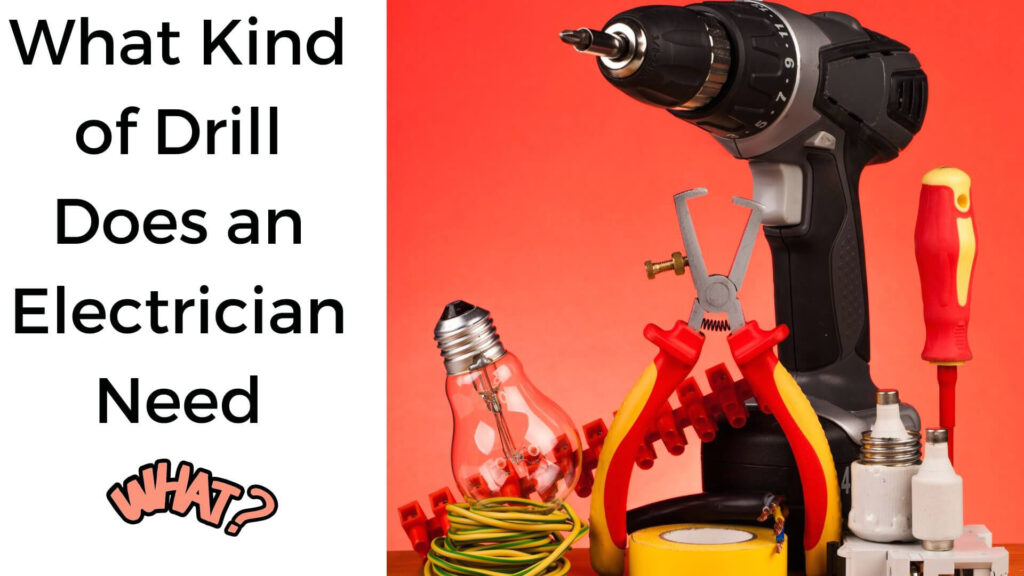As an electrician, having the right tools for the job is essential for getting the job done efficiently and effectively. One of the most important tools in your toolkit is a drill, and it’s crucial to choose the right one for your electrical work.
In this blog post, we’ll discuss the characteristics and features of the best drills for electrical work and the common types available on the market. Whether you’re a seasoned electrician or just starting out, this guide will help you understand what kind of drill you need to get the job done right.
From power and torque to chuck size and ergonomics, we’ll cover all the key factors you need to consider when choosing a drill for electrical work.
Table of Contents
Overview of the Importance of Drills for Electricians
As an electrician, your work often involves drilling holes into walls, ceilings, and floors to run electrical wiring, install fixtures, and make other necessary modifications. Without the right drill, these tasks can be time-consuming and challenging, which is why having the right drill is so important.
Brief Explanation of Different Types of Drills
There are several types of drills available, including cordless drills, hammer drills, rotary hammers, and impact drills. Each type of drill is designed for specific tasks and has different features and capabilities.
Importance of Choosing the Right Drill for Electrical Work
Choosing the right drill is essential for ensuring the success of your electrical work. The wrong drill can make the job more difficult, increase the risk of injury, and even damage the workpiece. When choosing a drill, you need to consider several factors, including power and torque, chuck size, ergonomics, and additional features and attachments.
Understanding these factors and what kind of drill is best suited for your electrical work will help you make an informed decision and get the job done right.
Characteristics of an Ideal Drill for Electrical Work
When it comes to electrical work, having the right tools is essential. A drill is a crucial tool for electricians, as it is used to make holes in walls, cabinets, and other surfaces to run wiring and install fixtures. However, not all drills are created equal, and it’s important to choose a drill that is well-suited for electrical work.
There are several characteristics to look for in a drill that is ideal for electrical work. Firstly, power and torque are key factors. Electrical work often involves drilling through tough materials such as steel and concrete, so a drill with high power and torque will make the job much easier.
Additionally, speed and performance are important. An electrician needs a drill that can operate quickly and efficiently to get the job done in a timely manner. The chuck size and bit compatibility are also important considerations, as the drill needs to be able to handle the various types of bits that are required for electrical work.
Finally, ergonomics and comfort are important. An electrician will be using the drill for extended periods of time, so it is important to choose a drill that is comfortable to hold and operate. A well-designed drill with an ergonomic handle will reduce the risk of hand fatigue, making the job easier and less physically taxing.
Common Types of Drills for Electrical Work
A. Corded Drills – Corded drills are powered by electricity from a wall outlet, which provides a constant source of power. They are typically more powerful than cordless drills and are ideal for heavy-duty jobs that require a lot of power. However, they are not as portable as cordless drills and are limited by the length of their power cord.
B. Cordless Drills – Cordless drills are powered by a rechargeable battery, which makes them portable and easy to use. They are great for jobs that require mobility, but they may not be as powerful as corded drills. The power of a cordless drill is also limited by the battery life, so it is important to choose a model with a long-lasting battery.
C. Hammer Drills – Hammer drills are specifically designed for drilling into masonry and other hard materials. They are typically more powerful than cordless and corded drills and have a hammering mechanism that helps to break up the material being drilled. They are ideal for drilling into concrete walls and floors, but are not as versatile as other types of drills.
D. Right-Angle Drills – Right-angle drills are designed for tight spaces and difficult-to-reach areas. They have a compact design and a 90-degree head, which allows them to be used in areas that other drills cannot reach. They are ideal for electrical work in tight spaces and for working in hard-to-reach areas, such as behind cabinets or in tight corners.
Conclusion
In conclusion, choosing the right drill for electrical work is important for the efficiency, safety, and success of the project. The ideal drill for electrical work should have the necessary power and torque, speed and performance, chuck size and bit compatibility, and ergonomic design for comfort during extended use.
When choosing a drill, electricians should consider their specific needs and preferences and weigh the pros and cons of corded, cordless, hammer, and right-angle drills.
Whether you are a professional electrician or a DIY enthusiast, taking the time to choose the right drill will ensure that your electrical projects are completed smoothly and safely

Hey, I am Shihab Uddin, I’m a huge fan of DIY crafts. My workshop is where I spend most of my spare time, and I’m always working on some project. To that end, I’d like to share some of my knowledge and experience with you in power tools, woodworking, and other specialized materials fabrication.
I will guide you with genuine knowledge that can assist you with deciding whether a drill is appropriate according to your requirements or not. If you want to find the best drill and know which type of drill is most suited for your needs, then I can guide you with my expertise. My passion lies in helping others find the correct products they need at an affordable price.


